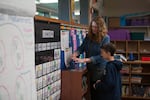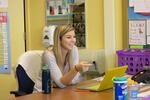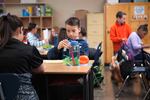
Cherry Park Elementary School third grade teacher Anne O'Brien helps Raiden sharpen his pencil in April 2016.
Rob Manning / OPB
It's the first day of school Wednesday for many of the kids in OPB's long-term project the "Class of 2025." They started kindergarten together, but they're in fourth grade now at a few different schools.
Some things are the same across Oregon schools. Some are different.
Like homework.
As third-graders, some kids in OPB's Class of 2025 had written homework. But not Austin or his classmates at Earl Boyles Elementary School.
"I don't actually get homework," Austin acknowledged. "I just get reading homework but no papers at all."
Research was behind the decision, said Austin's teacher, Michelle Moran.
“What have students gained from homework? And how do their scores in school go up,when they do work at home?" Moran asked rhetorically. "There wasn’t a lot of conclusive evidence. And we thought, well, they’re 8. Maybe they should be doing creative things, social things, time with their family — and reading," said Moran.

Michelle Moran is a new teacher, having started teaching in the 2015-16 school year with third graders at Earl Boyles Elementary School in the David Douglas School District.
Rob Manning / OPB
Students are expected to read at home and have their parents sign off on a reading log, said fellow third-grade teacher Linda Long.
The focus on reading is supported by research. Educators often emphasize that third-graders who are good readers do better later on than kids who aren't.
But at another David Douglas school, Cherry Park Elementary, students get math assignments as well.
Cherry Park third-grade teacher Anne O'Brien would sometimes field questions about the homework, like one time a student wanted to know what kinds of math will be assigned.
"It's been pretty mixed every single week, right?" O'Brien responded. "It'll continue to just review things we've covered. Little bit of everything."
O'Brien supports written homework for her third-graders, in part because of the work habits it teaches.
"I think it's kind of an important practice for them — to get used to it," O'Brien said. "The kids who don't get it done, they don't have a punishment, or anything like that. But I do keep track of it, and I do talk to them if they don't have it in, one-on-one."
One of O'Brien's students is a boy named Raiden. Like Austin at Earl Boyles and about 25 other children, OPB has been following Raiden since kindergarten as part of the "Class of 2025" project.
Raiden does his written homework reluctantly.
"I kind of like doing it at home," Raiden said at first, before admitting, "but not that much because I like playing outside, a lot."

Raiden is one of 27 students OPB is following in the Class of 2025 project. He started at Earl Boyles Elementary School, before transferring to Cherry Park Elementary (pictured here in the third grade).
Rob Manning / OPB
O'Brien says homework has a value for parents, too.
"It's nice for them to see what it is we're working on, what we've covered," O'Brien said. "So it's just this nice little communication with them, like 'Oh, this is what you're doing in math now'."
Sometimes parents discover their children may be falling behind or not fully understanding what's going on in class. Raiden's mother, Angela Williams, said she noticed difficulties Raiden was having in checking his homework.
"I don't think he has enough time to comprehend what he needs to do, and so he's always rushing, and it's not right, and he has to re-do it or no one ever tells him it's wrong, so he thinks he's doing it right, but then he comes home with homework, and I say 'No, that's wrong, you have to re-do it.' 'What do you mean Mom, why?'" Williams said.
Williams said she can help Raiden with some of his work, and she enjoys reading with him and his younger brother. But she said sometimes the math is beyond her ability to help her son.
"Maybe 15, 20 math problems — they could vary from times to finding the area of a triangle or a square, something," Williams said. "And those ones currently, he has no idea, and neither do I. I didn't learn that when I went to school."
Williams said teachers have offered additional help for Raiden. But Cherry Park Elementary School principal Kate Barker said homework should build on what kids are learning in class.
"The most important thing that we do need to consider is that the assignments we are sending home are meaningful and are enriching, instead of just, the busy work," Barker said. She said that's a departure from the packets she would assign as a teacher, 25 years ago.
Barker argued educators should remember the "home" in homework, too.
"Because the setting is very different from child to child," Barker said.
Raiden's housing situation has been in flux. His mother has struggled to find permanent housing for the family, moving between her mom's and her boyfriend's homes, recently.
Home situations vary, child to child, but when it comes to homework, there are different approaches depending on the school and grade level. Sometimes the differences show up in the same family, with younger kids receiving written homework when their older siblings might not.
